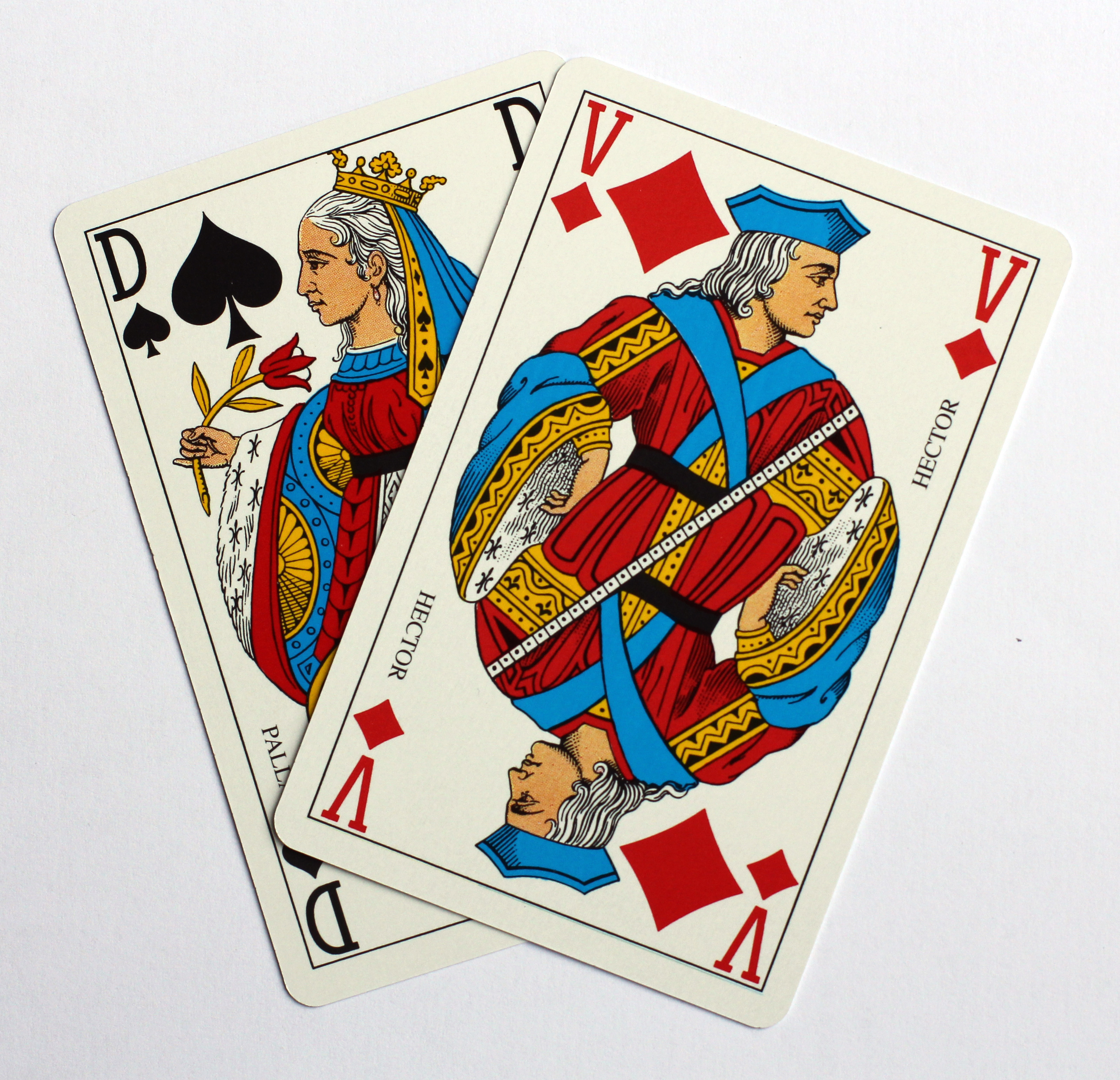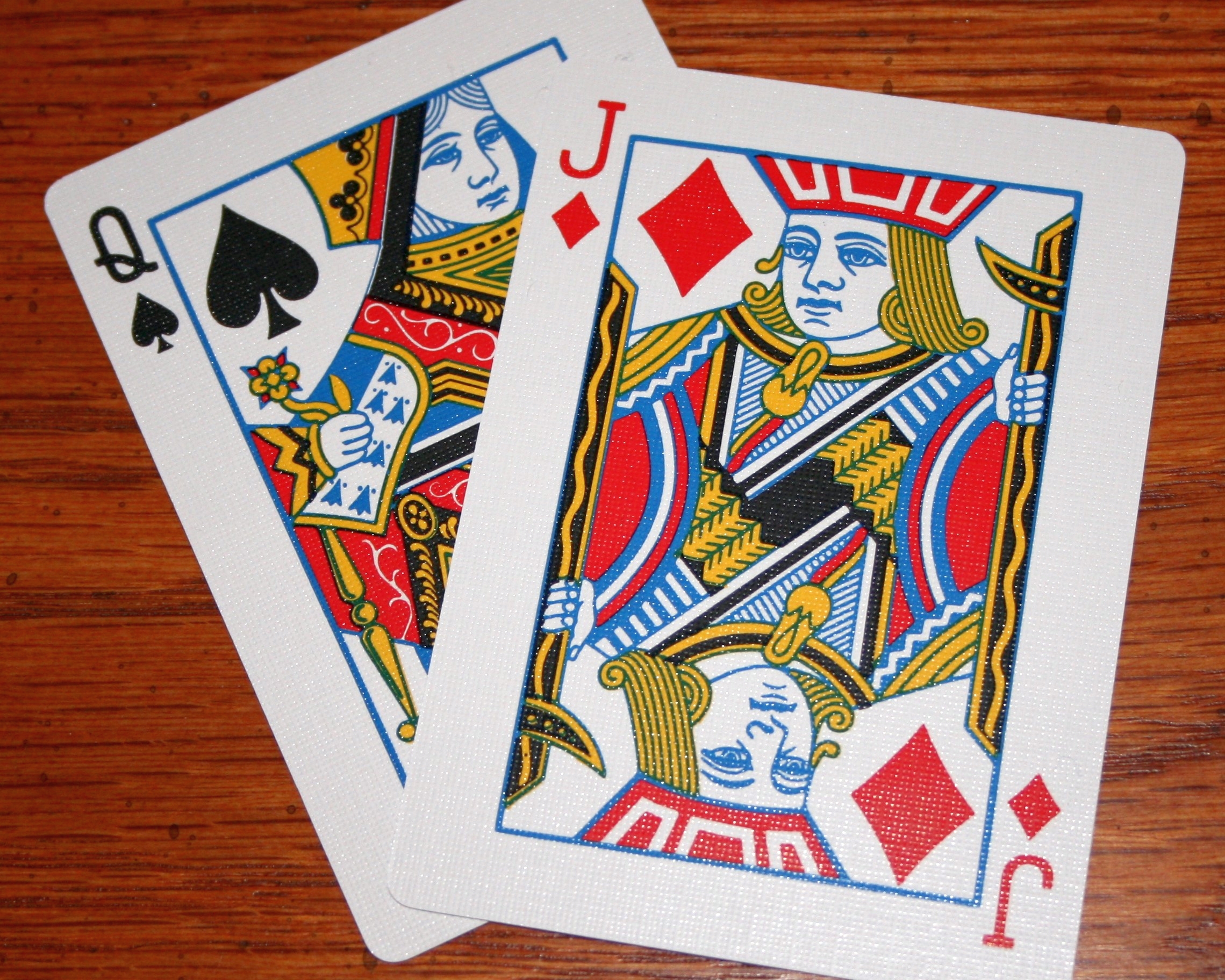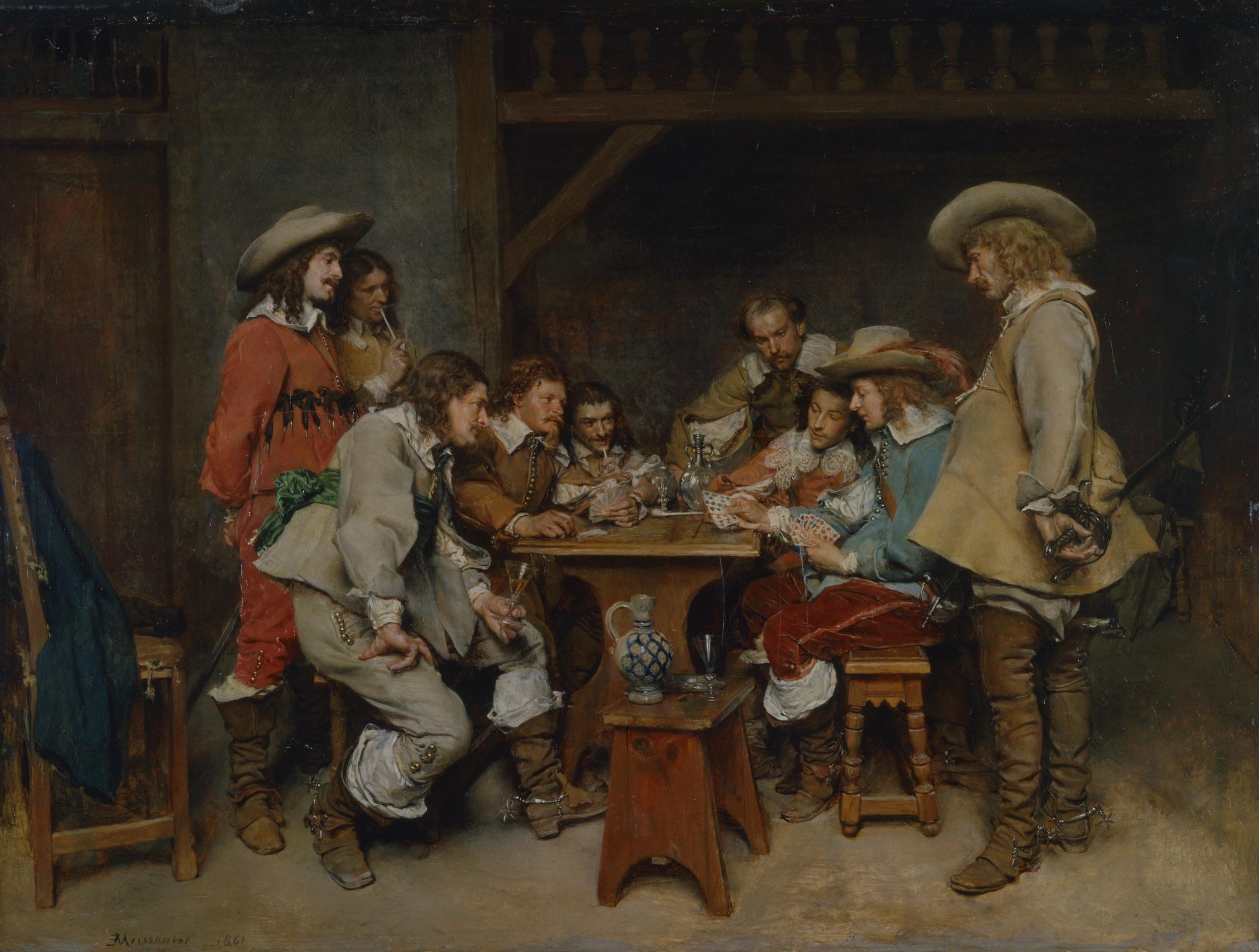|
Marjolet
Marjolet () is a French 6-card trick-and-draw game for two players using a 32-card piquet pack. It is of the Queen-Jack type, and thus a relative of Bezique and Pinochle Pinochle (), also called pinocle or penuchle, is a trick-taking, Ace-Ten card game typically for two to four players and played with a 48-card deck. It is derived from the card game bezique; players score points by trick-taking and also by fo ..., albeit simpler. The trump Jack is called the ''marjolet'' from which the name of the game derives. Rules Each player receives 6 cards in batches of 2 or 3. The next card is turned face-up to determine the trump suit and put crosswise under the stock. If it happens to be a seven, the dealer scores 10 points... Eldest hand leads to the first trick. While the stock contains cards, players can play any card they want. Once the stock is depleted they must follow suit, if possible, and win the trick, if possible. A player who cannot follow suit after the stock is de ... [...More Info...] [...Related Items...] OR: [Wikipedia] [Google] [Baidu] |
Bezique
Bezique () or Bésigue () is a 19th-century French melding and trick-taking card game for two players that came to Britain and is still played today. The game is derived from Piquet,''Transactions of the Philological Society'', Philological Society, pg. 289 - Philological Society (Great Britain) 1910 possibly via Marriage (Sixty-six) and Briscan, with additional scoring features, notably the peculiar liaison of the and that is also a feature of Pinochle, Binokel, and similarly named games that vary by country. History An early theory that appeared in the 1864 edition of ''The American Hoyle'' was that Bezique originated in Sweden as the result of a royal competition. This much repeated, but unsubstantiated, tale is recounted thus: "THE ROYAL GAME OF BÉZIQUE This interesting game is supposed to have originated in Sweden. It is said that during the reign of the First Charles (presumed to mean Charles I of England who reigned from 1625-1649)--a reward having been offered by tha ... [...More Info...] [...Related Items...] OR: [Wikipedia] [Google] [Baidu] |
Pinochle
Pinochle (), also called pinocle or penuchle, is a trick-taking, Ace-Ten card game typically for two to four players and played with a 48-card deck. It is derived from the card game bezique; players score points by trick-taking and also by forming combinations of cards into melds. It is thus considered part of a "trick-and-meld" category which also includes the game belote. Each hand is played in three phases: bidding, melds, and tricks. The standard game today is called "partnership auction pinochle". History Pinochle is thought to have two possible origins. One is that it is a cousin of Binokel, with both games evolving from the game of Bezique. A second alternative is that Pinochle actually developed from the Swiss and, later, South German game of Binocle or Binokel, which in turn is a descendant of Bezique. The word pinochle has several different potential derivations. It may come from the French word ''binocle'' literally meaning "two eyes", or "eyeglasses" or "binocular ... [...More Info...] [...Related Items...] OR: [Wikipedia] [Google] [Baidu] |
Binokel
Binokel is a card game for two to eight players that originated in Switzerland as Binocle, but spread to the German state of Württemberg, where it is typically played with a Württemberg pattern pack. It is still popular in Württemberg, where it is usually played in groups of three or four as a family game rather than in the pubs. In three-hand games, each player competes for himself, while in four-hand games, known as Cross Binokel (''Kreuzbinokel''), two teams are formed with partners sitting opposite one another. The game was introduced to America by German immigrants in the first half of the 20th century, where it developed into the similar game of pinochle. Binocle was still played in Switzerland in 1994. In south Germany, the game is sometimes called by its Swabian name, Benoggl. [...More Info...] [...Related Items...] OR: [Wikipedia] [Google] [Baidu] |
Trick-taking
A trick-taking game is a card or tile-based game in which play of a ''hand'' centers on a series of finite rounds or units of play, called ''tricks'', which are each evaluated to determine a winner or ''taker'' of that trick. The object of such games then may be closely tied to the number of tricks taken, as in plain-trick games such as contract bridge, whist, and spades, or to the value of the cards contained in taken tricks, as in point-trick games such as pinochle, the tarot family, briscola, and most evasion games like hearts. Trick-and-draw games are trick-taking games in which the players can fill up their hands after each trick. In most variants, players are free to play any card into a trick in the first phase of the game, but must ''follow suit'' as soon as the stock is depleted. Trick-avoidance games like reversis or polignac are those in which the aim is to avoid taking some or all tricks. The domino game Texas 42 is an example of a trick-taking game that is not a ca ... [...More Info...] [...Related Items...] OR: [Wikipedia] [Google] [Baidu] |
Playing Cards
A playing card is a piece of specially prepared card stock, heavy paper, thin cardboard, plastic-coated paper, cotton-paper blend, or thin plastic that is marked with distinguishing motifs. Often the front (face) and back of each card has a finish to make handling easier. They are most commonly used for playing card games, and are also used in magic tricks, cardistry, card throwing, and card houses; cards may also be collected. Some patterns of Tarot playing card are also used for divination, although bespoke cards for this use are more common. Playing cards are typically palm-sized for convenient handling, and usually are sold together in a set as a deck of cards or pack of cards. The most common type of playing card in the West is the French-suited, standard 52-card pack, of which the most widespread design is the English pattern, followed by the Belgian-Genoese pattern. However, many countries use other, traditional types of playing card, including those that are German ... [...More Info...] [...Related Items...] OR: [Wikipedia] [Google] [Baidu] |
Trick-and-draw Game
The asterisk ( ), from Late Latin , from Ancient Greek , ''asteriskos'', "little star", is a typographical symbol. It is so called because it resembles a conventional image of a heraldic star. Computer scientists and mathematicians often vocalize it as star (as, for example, in ''the A* search algorithm'' or ''C*-algebra''). In English, an asterisk is usually five- or six-pointed in sans-serif typefaces, six-pointed in serif typefaces, and six- or eight-pointed when handwritten. Its most common use is to call out a footnote. It is also often used to censor offensive words. In computer science, the asterisk is commonly used as a wildcard character, or to denote pointers, repetition, or multiplication. History The asterisk has already been used as a symbol in ice age cave paintings. There is also a two thousand-year-old character used by Aristarchus of Samothrace called the , , which he used when proofreading Homeric poetry to mark lines that were duplicated. Origen is know ... [...More Info...] [...Related Items...] OR: [Wikipedia] [Google] [Baidu] |
Piquet Pack
Piquet (; ) is an early 16th-century plain-trick card game for two players that became France's national game. David Parlett calls it a "classic game of relatively great antiquity... still one of the most skill-rewarding card games for two" but one which is now only played by "aficionados and connoisseurs." History Piquet is one of the oldest card games still being played. It is first mentioned, as ''Le Cent'', in a written reference dating to 1535, in ''Gargantua and Pantagruel'' by Rabelais. Although legend attributes the game's creation to Stephen de Vignolles, also known as La Hire, a knight in the service of Charles VII during the Hundred Years' War, it may possibly have come into France from Spain because the words "''pique''" and "''repique''", the main features of the game, are of Spanish origin. The earliest clear mention of the game – leaving aside various predecessors – is by the Spaniard, Jacques Perrache, in 1585 who refers to two unusual games, "premieres, & p ... [...More Info...] [...Related Items...] OR: [Wikipedia] [Google] [Baidu] |
Queen-Jack Card Games
The Marriage group is a large family of point-trick card games in which the 'marriage' of two cards, usually a King and Queen, plays an important role and attracts a bonus. They are believed to be descended from a German game, Mariagenspiel or Mariage, which dates back to at least 1715. Well-known games in this group include Bezique and the national card games of Austria (Schnapsen), Hungary ( Ulti), France (Belote), Switzerland (Jass) and the Netherlands (Klaverjas). Description Mariagenspiel (German for '' game'', using the original French word for marriage rather than the German word, ''Heiraten'') is the earliest and most typical representative of the group. It was first described in a 1715 ladies' encyclopedia printed in Leipzig. The game's entry said that the game was popular among ladies, and the entry for ''playing card'' listed ' first among nine card games played with the German pack. Despite the marriage theme, the Queen was replaced by the equivalent male character ... [...More Info...] [...Related Items...] OR: [Wikipedia] [Google] [Baidu] |
Eldest Hand
Card players are those participating in a card game. Various names are given to card players based on their role or position. Position Games of Anglo-American origin In games of Anglo-American origin played in English-speaking countries, age refers to the order of priority in which players make the first lead, bid or bet, based on their position at the table.''The Language of Cards'' at www.parlettgames.uk. Retrieved 4 August 2018 This changes constantly as the dealer rotates either clockwise or anticlockwise around the table. They are traditionally referred to as follows: ; Eldest hand (or elder hand): the player who enjoys greatest priority and e.g. is the first to receive cards in the deal. Elder is the non-dealer in two-hand games. ; Youngest hand (or younger hand): the player who has the lowest p ... [...More Info...] [...Related Items...] OR: [Wikipedia] [Google] [Baidu] |
French Card Games
French (french: français(e), link=no) may refer to: * Something of, from, or related to France ** French language, which originated in France, and its various dialects and accents ** French people, a nation and ethnic group identified with France ** French cuisine, cooking traditions and practices Fortnite French places Arts and media * The French (band), a British rock band * "French" (episode), a live-action episode of ''The Super Mario Bros. Super Show!'' * ''Française'' (film), 2008 * French Stewart (born 1964), American actor Other uses * French (surname), a surname (including a list of people with the name) * French (tunic), a particular type of military jacket or tunic used in the Russian Empire and Soviet Union * French's, an American brand of mustard condiment * French catheter scale, a unit of measurement of diameter * French Defence, a chess opening * French kiss, a type of kiss involving the tongue See also * France (other) * Franch, a surname * Frenc ... [...More Info...] [...Related Items...] OR: [Wikipedia] [Google] [Baidu] |
Two-player Card Games
A multiplayer video game is a video game in which more than one person can play in the same game environment at the same time, either locally on the same computing system (couch co-op), on different computing systems via a local area network, or via a wide area network, most commonly the Internet (e.g. ''World of Warcraft'', ''Call of Duty'', DayZ (video game), ''DayZ''). Multiplayer games usually require players to share a single game system or use Mobile network, networking technology to play together over a greater distance; players may compete against one or more human contestants, work Cooperative video game, cooperatively with a human partner to achieve a common goal, or Gamemaster, supervise other players' activity. Due to multiplayer games allowing players to interact with other individuals, they provide an element of social communication absent from single-player games. History Non-networked Some of the earliest video games were two-player games, including early sports g ... [...More Info...] [...Related Items...] OR: [Wikipedia] [Google] [Baidu] |






